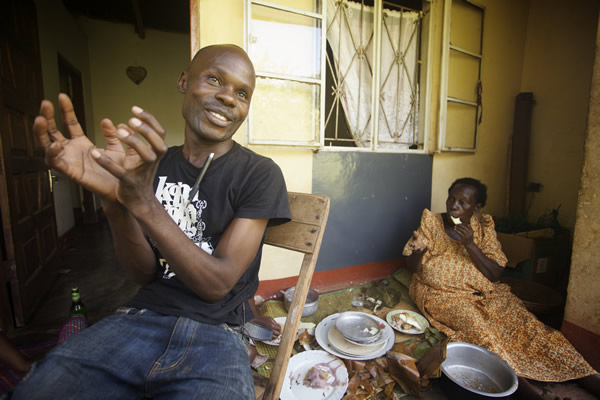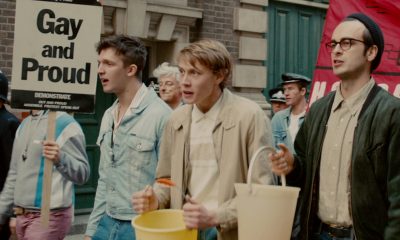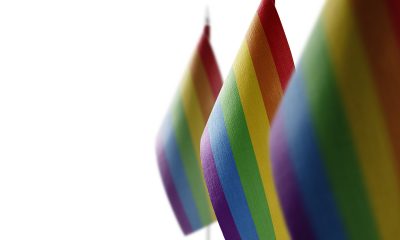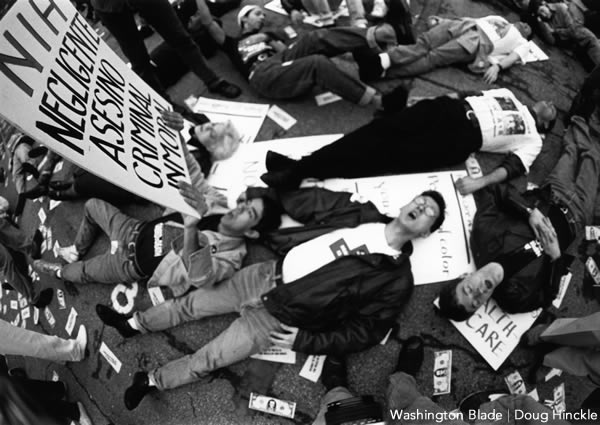Arts & Entertainment
Documenting our lives
Story of slain Ugandan activist among LGBT stories at Silverdocs festival
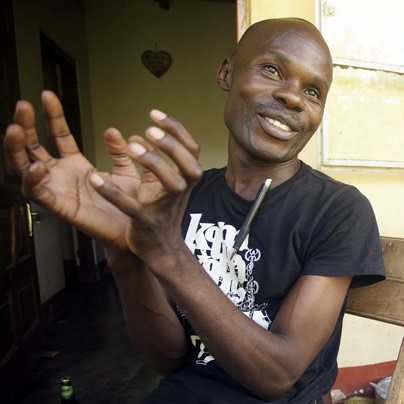
Silverdocs Festival
June 18-24
AFI Silver Theatre
8633 Colesville Rd., Silver Spring
‘Call Me Kuchu’ — June 20 at 9:30 p.m. and June 22 at 8:30 p.m.
‘How to Survive a Plague’ — June 20 at 7 p.m.
‘Ray: A Life Underwater’ — June 21 at noon.
Individual tickets cost $12, however Silverdocs is offering various package deals that allow access to multiple screenings and the conference.
When two filmmakers set out to capture the work of LGBT activist and Uganda’s first openly gay man, they didn’t realize they were also filming the last year of his life.
“It was an incredibly hard thing to go through,” says Malika Zouhali-Worrall of her work with the late David Kato. “We spent a lot of time with him while he was working and during his private time. It came as an awful shock to both of us.”
Worrall and fellow filmmaker Katherine Wright tell Kato’s story in their new documentary “Call Me Kuchu,” which is screening in the upcoming Silverdocs Festival at the AFI Silver Theatre, which kicks off Monday for its 10th year. It’s a seven-day film festival with a five-day conference that promotes documentary film as an art form.
Sky Sitney, festival director of Silverdocs, says the movie will shock those who are largely unaware of what is happening in Uganda while drawing viewers close to the subjects.
“I think it is the way the film takes the topic and weaves it through personal stories, allows intimate access so that you are deeply invested in their lives, that makes it so powerful,” she says.
Worrall is a freelance reporter for CNN and this is her first feature length film. Wright was a film studies and anthropology major at Columbia University and has produced other feature length films including, “Gabi On the Roof in July,” while also directing shorts.
Worrall and Wright began filming in January 2010 after a transgender man named Victor Mukasa won a court case in the high court of Uganda, granting him his right to privacy after it had been violated during a raid. They shot the film with a less than $300,000 budget provided by various backers and a Kickstarter fundraising campaign. The filmmakers chose the term “kuchu” because this is the umbrella term used there for members of the LGBT community.
The film observes Kato and other activists as they fervently try to get Uganda’s homophobic laws repealed while preventing a new anti-homosexuality bill from passing in parliament. The new law would have HIV-positive gay men sentenced to death while others would be sentenced to life imprisonment. Kato was one of the founding members of Sexual Minorities Uganda, an underground movement for LGBT rights. However, Kato’s life abruptly ended when a man named Sidney Nsubuga Enoch, a local gardener and apparently a well-known thief, murdered him in his home.
At the time, Wright and Worrall were in New York planning their next trip to Uganda to shoot. They decided they needed to go back to Uganda immediately — Wright left the next day.
“We realized our film suddenly became about the last year of Kato’s life and added a sense of urgency, it was really intense,” Worrall says.
Though the documentary is LGBT specific, it was not this element that attracted Worrall and Wright to Uganda.
“It wasn’t so much that I was interested in LGBT rights more than any other human rights, but more that these people had these destinies laid out for them by these laws,” Wright says.
To fully depict the causes of these laws and their effect, the filmmakers traveled back and forth between anti-gay community members and LGBT activists. Both Worrall and Wright say it’s important for American audiences to understand what inspired the creation of the new bill.
“Getting all the basic facts is really important,” Worrall says. “Understanding what is happening in Uganda, and that it is very much related to American evangelicals and American foreign policy.”
Specifically, Scott Lively, Caleb Lee Brundidge and Don Schmierer, all American evangelicals, were invited to participate in a workshop in Uganda in 2009 where they spoke about the international “gay agenda.” According to a New York Times article, Lively told attendees that gays sodomize children and would destroy the culture. Soon after the bill was proposed, Worrall says they filmed a scene where a group of evangelicals celebrated and praised the government for proposing it.
Despite the hostility toward the LGBT community, members were still able to find ways to enjoy their lives. Wright says capturing these moments was of special importance to them.
“It was invigorating to see how these people were able to organize themselves despite the persecution,” she says. “It wasn’t the narrative victimization that you might have expected.”
Filming members of the LGBT community could still threaten their security, and some declined to be shown on camera for fear of being outed by local tabloids, which list LGBT people by name under headlines, “Homo Terror! We Name and Shame Top Gays,” according to the movie’s website.
Though Worrall and Wright are straight, they wanted to use the work being done by the LGBT community as a different way to approach Uganda, and by extension Africa.
“It was a way to capture a vivid portrait of people,” Worrall says. “Especially now that David is gone it has become very urgent.”
Worrall will be attending the Silverdocs with one of the film’s protagonists, Long Jones. The U.S. premiere of the film is occurring at the Los Angeles Film Festival on Saturday. The screening at Silverdocs will be the East Coast premiere of the film and will occur on June 20 and June 22 near the end of the festival.
“We are very excited to premiere it in the U.S.,” Worrall says. “It was first premiered in the Berlin Film Festival and the reaction there was incredible.”
Sitney says “Call Me Kuchu” will provide a juxtaposition to another film with LGBT themes, “How to Survive a Plague,” which revisits the 1980s when HIV/AIDS was still greatly feared and effective treatment was largely unavailable.
“One film is showing an injustice that is going on literally today and the act of change in positive and negative ways,” she says. “One is a retrospective look, to see what has changed and what has remained the same.”
“Call Me Kuchu,” which runs 87 minutes, is in the running for a grand jury prize while “How to Survive a Plague,” is one of the centerpieces of the festival.
Another film that doesn’t have prevalent LGBT themes but is directed by lesbian director Amanda Bluglass is “Ray: A Life Underwater,” a 14-minute short provides a portrait of 75-year-old deep-sea diver named Ray Ives who has been exploring the bottom of the ocean for 50 years while wearing a diving suit from the 1900s.
Sitney says that including these films adds to the diversity of the festival, but they do not specifically look for films with LGBT themes, or any specific themes, when reviewing submissions.
“We already make this festival exclusively about documentary films, we don’t want to set too many other boundaries,” she says. “We don’t choose central themes, but some emerge unintentionally.”
Sitney says that each film should be accessible to a non-LGBT audience, by breaking cultural parameters to create a “stunning and beautiful quality of work.”

Friday, July 11
“Center Aging Friday tea Time” will be at 2 p.m. in person at the DC Center for the LGBT Community’s new location at 1827 Wiltberger St., N.W. This is a social hour for older LGBTQ+ adults. Guests are encouraged to bring a beverage of choice. For more details, email [email protected].
Women in Their Twenties and Thirties will be at 8 p.m. on Zoom. This is a social discussion group for queer women in the Washington, D.C. area and a great way to make new friends and meet other queer women in a fun and friendly setting. For more details, visit the DC Center’s website.
Go Gay DC will host “LGBTQ+ Happy Hour” at 7 p.m. at Firefly. This event is ideal for making new friends, professional networking, idea-sharing, and community building. This event is free and more details are available on Eventbrite.
Saturday, July 12
Go Gay DC will host “Family Fun Story Time” at 12 p.m. at Freddie’s Beach Bar & Restaurant. Join award-winning drag queen Tara Hoot for songs, stories, bubbles, puppets and dancing. It’s the feel-good event you didn’t know you needed. This event is perfect for kids and kids at heart. Attendance is free and more details are available on Eventbrite.
Miss Capital Pride will host “DC Drag brunch on Rooftop – Penthouse” at 12 p.m. at MXDC Cocina Mexicana. Guests will experience a Mexican brunch infused with Baby Shank’s signature dishes, complemented by delicious margaritas and mimosas, all within the beautiful and spacious atmosphere of MXDC. There will also be outstanding performances by glamorous drag queens and celebrated celebrity impersonators, featuring Taylor Swift, Lady Gaga, Beyoncé, Britney Spears, Nicki Minaj, Ariana Grande, Whitney Houston, Cher, and many more. Tickets cost $30.65 and are available on Eventbrite.
Sunday, July 13
The National Portrait Gallery will host “Stormé at Stonewall” at 1:30 p.m. This is a gallery talk with LJ Roberts and Charlotte Ickes. This exhibition is a light-box portrait of activist Stormé DeLarverie, who is said to have thrown the first brick at Stonewall—the uprising credited with launching the modern LGBTQ+ rights movement in 1969. Roberts created this unconventional portrait in response to DeLarverie’s absence in mainstream narratives about the history of the Stonewall rebellion. Attendance is free and more details are available on Eventbrite.
Monday, July 14
“Center Aging Monday Coffee Klatch” will be at 10 a.m. on Zoom. This is a social hour for older LGBTQ+ adults. Guests are encouraged to bring a beverage of choice. For more details, email [email protected].
Genderqueer DC will be at 7 p.m. in person at the DC Center for the LGBT Community. This is a support group for people who identify outside of the gender binary, whether you’re bigender, agender, genderfluid, or just know that you’re not 100% cis. For more details, visit genderqueerdc.org or Facebook.
Tuesday, July 15
Center Bi+ Roundtable will be at 7 p.m. on Zoom. This is an opportunity for people to gather in order to discuss issues related to bisexuality or as bi individuals in a private setting.Visit Facebook or Meetup for more information.
Wednesday, July 16
Job Club will be at 6 p.m. on Zoom. This is a weekly job support program to help job entrants and seekers, including the long-term unemployed, improve self-confidence, motivation, resilience and productivity for effective job searches and networking — allowing participants to move away from being merely “applicants” toward being “candidates.” For more information, email [email protected] or visit thedccenter.org/careers.
Thursday, July 17
The DC Center’s Fresh Produce Program will be held all day at the DC Center for the LGBT Community. People will be informed on Wednesday at 5 p.m. if they are picked to receive a produce box. No proof of residency or income is required. For more information, email [email protected] or call 202-682-2245.
Virtual Yoga with Charles M. will be at 7 p.m. on Zoom. This is a free weekly class focusing on yoga, breath work, and meditation. For more details, visit the DC Center for the LGBT Community’s website.
Lit Lovers: Book Club for Seniors will be at 2 p.m. on Zoom. The book selection for July is “Rubyfruit Jungle” by Rita Mae Brown. For more details, visit the DC Center’s website.
Poly Discussion Group will be at 7 p.m. on Zoom. This is an inclusive, welcoming, virtual safer space to talk about all things polyamorous — the rapturous, the confused, the pure YIKES, we want to hear them all. For more details, email [email protected].
Television
ICYMI: ‘Overcompensating’ a surprisingly sweet queer treat
A sweet, savvy show about breaking free to embrace your true self

Pride month 2025 is now behind us, and while it’s safe to say that this year’s celebrations had a darker edge than usual, it’s also true that they came with a particularly rich bounty of new queer movies and shows to entertain us – so many, in fact, that even if we are facing a lull until the fall another harvest of fresh content, there are still plenty of titles – which, for whatever reason, were off your radar – for you to catch up on in the meantime.
One of the most notable of these – the bingeworthy series “Overcompensating” (now streaming on Amazon Prime) – will most definitely have been ON the radar for the plentiful fans of creator and star Benito Skinner, the actor/comedian who rose to viral fame through his content on platforms like Instagram, YouTube, and TikTok. For anyone else, it might have easily slipped through the cracks.
Created and written by Skinner as a loosely autobiographical “college comedy,” it aims for the kind of raucous, explicitly sexed-up tone one expects from the genre as it centers on Benny (Skinner), newly arrived as a freshman at prestigious Yates University. A former football jock and “golden boy” at his midwestern high school, he’s the picture of idealized youthful masculinity; he’s also deep in the closet, struggling to keep his sexuality hidden and maintain his macho front under the intense scrutiny of the college’s social scene – and under the resentful eye of his older sister Grace (Mary Beth Barone), who has already secured her own place at the top of the pecking order.
In the first episode, Benny’s difficulties are eased when he meets Carmen (Wally Baram), another freshman trying to navigate the politics of college life; a gamer from a home marred by tragedy, she’s an outsider who feels like she’s putting on an act, too, and they click – giving him the convenient “cover” of female companionship while providing them both with much-needed support and encouragement. He’s also befriended by a handsome film major from England (Rish Shah), who has already caught his eye, stirring other kinds of feelings and possibly even reciprocating them. Meanwhile, he’s being courted by the school’s “exclusive secret society” – headed by his sister’s aggressively “alpha” boyfriend Pete (Adam DiMarco) – and trying to stay interested in his studies, despite a growing realization that a career in business doesn’t actually appeal to him all that much.
That’s a lot to juggle for anybody, even an overachiever like Benny – whose “lucky” life so far has largely been the result of playing a role he is finding harder and harder to maintain. As the series goes on through its eight-episode arc, it becomes clear that he’s not the only one who is “keeping up appearances,” and he, along with the other confused and damaged young people in his orbit, begins the painful (but often hilarious) process of evolution that is required in order to become truly oneself.
Directed toward appealing to a younger demographic, “Overcompensating” is the kind of show that requires a few episodes worth of invested time to make an impression that feels like substance. Full of the bawdy farcical antics that go hand in hand with stories about hormonally charged college kids, it’s not above leaning into the formulas and tropes that have always driven these kinds of comedies. At first, while its broadly comedic strokes and frequently explicit sexual hijinks might elicit plenty of chuckles, the show might easily feel tiresome for more mature audiences; there’s a nostalgic fun to it, made even more appealing, somehow, by the “political incorrectness” of its frequently sexist and homophobic humor, but for a while things may feel like an unnecessary attempt to reinvent “Animal House” for the Gen Z crowd.
By the time the season reaches its halfway point, however, things have started to get real. The antics of these horny almost-adults take on a more pointed absurdity, informed by the increasingly tangled web of defensive deceit they weave among themselves – and, as things draw toward a cliffhanger climax, the consequences of maintaining it – until it achieves a sense of empathy toward them all. There’s a wisdom that smacks of lived authenticity underlying the whole affair, transforming it from the “sexploitative” teen comedy of its surface into something deeper. To be sure, things stay expectedly wacky, and the soap-operatic melodrama of its twists and reversals continue to maintain the show’s “mature YA” appeal; but beneath those trappings, by the end of the season a truer identity has begun to emerge, just as its characters have begun to find their own levels of self-actualization for themselves.
As creator, primary writer, and star, it’s obviously Skinner who deserves much of the credit. While it might be tempting, early on, to dismiss the show as an “ego project,” the internet-spawned sensation proves his talents quickly enough to get past such judgy suspicions, delivering a pitch-perfect blend of sauciness and sensitivity that extends its appeal toward both ends of the taste spectrum; just as crucially, he brings the same aforementioned “lived authenticity” to his winning performance – after all, he’s essentially playing himself in a fictionalized version of his own life – while also making sure that equal time (and compassion) is afforded all the other characters around him, each of whom are pushing at the boundaries of their own respective “closets,” too. It’s unavoidable to notice that – like most of his co-stars – he’s plainly a decade too old to be playing a college student; but by the time we reach that crucial halfway turning point, we’ve become too engaged by him to care.
The show is full of excellent performances, in fact. Relative newcomers Baram and Barone offer layers of complex nuance, while the more familiar DiMarco (“White Lotus”) is close to heartbreaking as the toxic BMOC clinging to the illusion of power as his life begins unraveling around him. Other standouts include the mononymic actress Holmes as Carmen’s “wild child” roommate, solidly likable turns as Benny’s parents from mature veterans Connie Britten and Kyle MacLachlan (whose presence, along with stylish elements in several key scenes, hints at an homage-ish nod to the late David Lynch), and podcaster Owen Thiele as an openly gay fellow student who has Benny “clocked” from the moment they meet. Finally, Lukas Gage makes a deep impression as a former high school teammate at the heart of Benny’s most haunting memory.
There’s no official word yet on whether “Overcompensating” will be renewed for a second season, despite the multiple loose ends left dangling at the end of its first; it has proven to be popular, and Skinner’s large fanbase makes it likely that the story will continue. Even if it doesn’t, the place of uncertainty in which it has left its characters rings true enough to serve as a satisfying endpoint.
As for us, we hope that won’t happen. For all its sophomoric humor, generic plot twists, and purposefully gratuitous sexual titillation, it’s one of the sweetest, kindest, and most savvy shows we’ve seen about breaking free from conformity to embrace your true self – and that’s a message that applies whether you’re queer, straight, or anywhere in between.
Photos
PHOTOS: Independence Day Weekend in Rehoboth
Wicked Green Pool Party, fireworks among festivities

Vacationers and residents alike enjoyed Independence Day Weekend activities in Rehoboth Beach, Del. The Wicked Green Pool Party drew hundreds to the CAMP Rehoboth fundraiser on Saturday. That evening, revelers went to the rooftops to watch the fireworks display.
(Washington Blade photos by Daniel Truitt)













-

 Federal Government2 days ago
Federal Government2 days agoTreasury Department has a gay secretary but LGBTQ staff are under siege
-

 Virginia3 days ago
Virginia3 days agoDefying trends, new LGBTQ center opens in rural Winchester, Va.
-

 District of Columbia2 days ago
District of Columbia2 days agoGay GOP group hosts Ernst, 3 House members — all of whom oppose Equality Act
-

 District of Columbia2 days ago
District of Columbia2 days agoD.C. police seek public’s help in July 5 murder of trans woman

